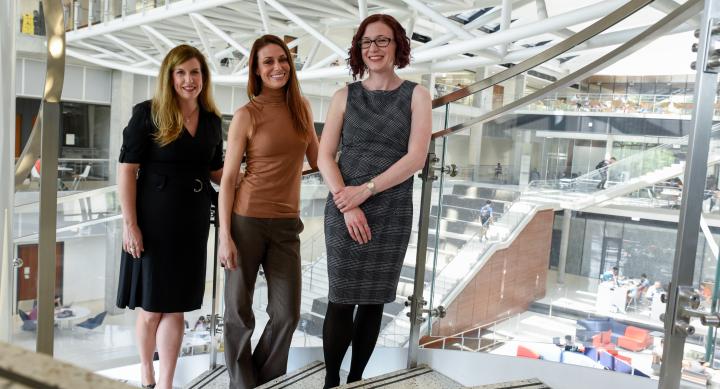
Three researchers focused on the neurobiology of addiction at The University of Texas at Austin joined the Waggoner Center for Alcohol and Addiction Research as affiliated faculty members: Lauren Dobbs, assistant professor in the Department of Neuroscience, and Regina Mangieri, research assistant professor, and Kimberly Nixon, associate professor and James T. Doluisio Centennial Fellow, in the Division of Pharmacology and Toxicology.
Dobbs hopes to change public perception of alcoholism and related illnesses.
"I’m pursuing this topic because I want to help public health and because I want people to see substance use disorders as treatable diseases,” she said.
Her lab studies the circuit mechanisms underlying polysubstance abuse. Though evidence indicates that opiates and cocaine target distinct components of the brain’s reward circuitry, she plans to pursue the hypothesis that these distinct components interact within a common circuit to ultimately elicit the expression of similar drug seeking and taking behaviors for both substances.
Following a postdoctoral fellowship in the Laboratory on Neurobiology of Compulsive Behaviors at the National Institute on Alcohol Abuse and Alcoholism, she was drawn to the center’s partnerships across disciplines—between clinicians and scientists.
"I think the science is better when we do it in a collaborative environment,” said Dobbs, who also has
a courtesy faculty appointment in the Department of Neurology at Dell Medical School.
Mangieri’s research examines how neuroimmune signaling molecules impact neurophysiology and alcohol-reinforced behaviors.
She heads the Target Validation Electrophysiology Core of the Integrative Neuroscience Initiative on Alcoholism-Neuroimmune Consortium, which is led by R. Adron Harris, the center’s associate director.
Long-term, she would like to be influential in identifying more effective drug therapies.
"It’s very motivating to know that I get to go to work and do something that will hopefully one day benefit people that I care about,” she said.
Nixon was previously a faculty member at the University of Kentucky and a postdoctoral fellow at the Bowles Center for Alcohol Studies at the University of North Carolina School of Medicine, where she studied the effect of alcohol on adult neurogenesis—an area her lab continues to lead today.
"We look at different cellular events that happen in response to typical binge-like exposure and how that damage then contributes to changes in the brain,” she said.
Nixon, who received her Ph.D. from UT Austin, is thrilled to be back at the university and to be part of the center.
"I jumped on [the opportunity] because of the center’s outstanding reputation. It is just ahead of the curve on so many fronts.”
She would ultimately like to find a novel treatment that would help reverse alcoholic brain damage.